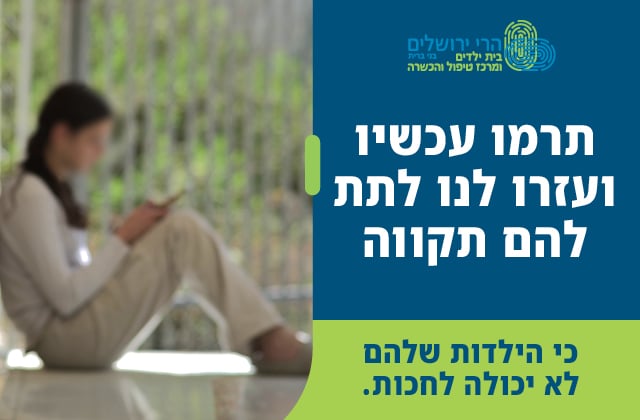THERAPY IN LIFE SPACE
Jerusalem Hills responds to the needs of the at-risk children and adolescents that arrive at our facilities, with our unique long-term relationship-based treatment program. This program, Therapy in Life Space, is centered upon the development of a one-on-one relationship between the child and the caregiver, and the careful integration of the child’s family into the healing process.
The Four Principles of the Rehabilitative Process:
1 – Long-term therapeutic treatment program
Children need to feel loved and be in a protective environment in which to develop confidence, independence, and self-esteem, but building this trust and self-confidence takes time. Jerusalem Hills offers a healthy, stable physical and emotional environment as the framework for our therapeutic treatment program, whose duration is usually a minimum of 4 years. During this time every aspect of the young resident’s day is carefully orchestrated to provide the consistency and stability that was missing in his or her early years.
In addition to individual psychotherapy sessions with a skilled psychologist, Jerusalem Hills offers a variety of therapies to suit the specific needs of each child. These include, among others, art therapy, occupational therapy, music therapy, pet-assisted therapy, and equine therapy
2 – One-on-one staff-to-child ratio
Our treatment approach is to nurture intensive one-on-one interaction between staff and children with the goal of developing long-lasting relationships based on trust and mutual respect. The same dedicated team of child-care workers, teachers, psychologists, social workers, and unit coordinators accompanies the children of each unit throughout their stay at Jerusalem Hills, meeting regularly to evaluate each child’s progress and plan together every therapeutic step on the way to mainstreaming.
3 – Family involvement
The psychological assistance and overall support that families receive at Jerusalem Hills is an inseparable part of the treatment program. Parents regularly visit their children. They also attend weekly sessions with our on-campus social workers. We offer the parents a place where they can learn to accept themselves by accepting their deepest feelings, helping them in their relationships within the family, providing the means for growing closer to their child, and enabling them to face certain realities. The parent finds an attentive ear, a safe and non-judgmental haven, and acceptance together with guidance and help in facing their most painful and frightening feelings.
The aim of this family support program is to address the parents’ needs directly, to help them come to terms with the placement of their child in a residential treatment setting, to develop tools that will help them cope with the grave and difficult issues in their own lives and to facilitate the rehabilitation of the parent-child relationship with the hope of reinstating as much as possible a functioning family environment.
By working to rehabilitate both the children and the parents of these fractured families, we are effecting social change and strengthening Israeli society.
4 – Staff Training and Support – Helping the Helpers
The key to maintaining a stable environment for the children is a long-term commitment from our excellent therapeutic team which creates a consistent and comprehensive support network. Jerusalem Hills offers extensive in-service training programs for the entire team, that include daily supervisory and consultation meetings, and weekly planning and counseling sessions that address emotional and therapeutic issues encountered during the course of their work. Professionals from Israel and abroad frequently visit the Jerusalem Hills campus to see firsthand the implementation of our unique in-service training network.

